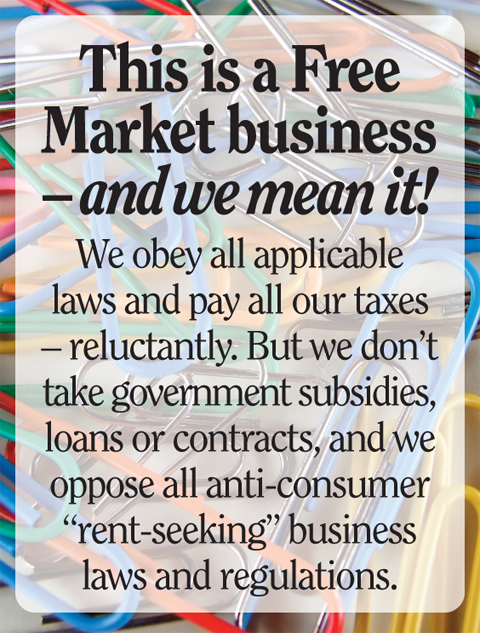It’s vampire versus vampire at the National Review. In response to President Obama’s “you didn’t build that” attack on individual initiative, a New Hampshire contractor insisted that he did so build his business. Except, as Think Progress reports, the guy is a rent-seeker. He built his business by the sweat of the tax-payer’s brow in the form of government-subsidized loans, grants and contracts.
The Think Progress article is disgusting, and the comments are worse, but the National Review piece isn’t much better:
This man pays taxes that support this government endeavor (and many others he does not benefit from),
That would be the logical fallacy Two Wrongs Make A Right.
and he is operating in a business environment in which all his competitors have access to government funds.
And that is the logical fallacy Tu Quoque.
This is me in Man Alive!:
The paths to error are infinite, but two landmarks I have learned to rely on, in listening to people trying to justify their evil actions, are the logical fallacies Tu Quoque and Two Wrongs Make A Right. Tu Quoque is Latin. It means, “You do it, too.” When you catch your teenager swiping a beer, the pre-fabricated rationale will surely be, “Well, you drink, why can’t I?!?” And you were probably very young when you first heard some little proto-brute justifying his vengeance by bellowing, “Well, he hit me first!” — ergo, two wrongs make a right. You should probably be on your guard against any statement that starts with a “well” and ends with an exclamation point. That particular verbal construction seems to fit very comfortably in the mouths of liars and thugs. But when you hear those two logical fallacies being deployed in tandem, what you are hearing, almost certainly, is a cunningly-crafted rationalization of an abominable injustice.
This is the comment I left to the atrocious argument at National Review:
Taking money from the government in any form is welfare — receiving stolen funds.
You can’t avoid using government roads; the state is a coercive monopoly on roads and other so-called “public services.”
You definitely can avoid taking money that has been stolen from innocent tax-payers.
When you take that money, no matter how you rationalize it, you are a moocher, a looter, a thug, a welfare slave.
This is obvious, no need to tap-dance around it.
That was a conversation stopper. I shouldn’t complain, though. Very often, when I leave comments at conservative web sites, they never show up at all.
Are you bursting with the need to say, “Yeah, but…”? Let me do it for you:
“Yeah, but surely I’m entitled to get something back from my taxes.” The word ‘entitled’ almost always denotes welfare-slavery, but it means nothing in a context where you do not have a legally-enforceable contract. Your money was stolen from you, yes. But once it was, it became part of a vast pool of stolen funds, and none of that money is yours. When you presume to claim some of it, you are making yourself complicit in the slavery of innocent people whose sole crime was working to provide for themselves and their loved ones.
“Yeah, but if I don’t take that money, somebody else will.” If so, the people who take it will have soiled themselves. What benefit to you self-adoration will you realize by soiling your self?
“Yeah, but just because I built my business with coerced ‘investments,’ that doesn’t make me the bad guy!” Yes, it does. There is no way to tap-dance around theft.
In truth, most small-businesses don’t take government money. The owners of those firms are the victims of the state’s countless intrusions, and they persevere gamely while bearing unbearable parasitic burdens. They did build their businesses themselves, with no stolen funds or rent-seeking favors, and they have every right to be proud of themselves. But by giving rent-seekers cover — by permitting tax-looting thugs to call themselves business-people — they arm their own enemies.
Here is a sign I made for honest entrepreneurs:
I would love to see this posted prominently in every place of business in America. If you are not the crook, the leech, the moocher that the president of the United States says you are, tell it to the world — starting with your customers.
And if you have taken tax money in the past? If you have campaigned for competition-killing laws? Go forth and sin no more. You were wrong, but now you know you were wrong. The past cannot be changed, but the future can. If you continue to try to live as a looter, you will know without doubt what you are — and so will everyone else. When your neighbors and competitors finally get up the nerve to celebrate their own virtue, they will have no trouble at all expressing contempt for your vice.
And in the battle of vampire versus vampire, scrupulous honesty slays every demon.
















